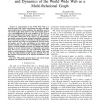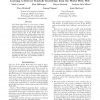38 search results - page 1 / 8 » On-demand new word learning using world wide web |
ICASSP
2008
IEEE
13 years 11 months ago
2008
IEEE
Most of the Web-based methods for lexicon augmenting consist in capturing global semantic features of the targeted domain in order to collect relevant documents from the Web. We s...
SOCIALCOM
2010
13 years 2 months ago
2010
A representation of the World Wide Web as a directed graph, with vertices representing web pages and edges representing hypertext links, underpins the algorithms used by web search...
AAAI
1998
13 years 6 months ago
1998
The World Wide Web is a vast source of information accessible to computers, but understandable only to humans. The goal of the research described here is to automatically create a...
AI
2000
Springer
13 years 4 months ago
2000
Springer
The World Wide Web is a vast source of information accessible to computers, but understandable only to humans. The goal of the research described here is to automatically create a...
JCST
2000
13 years 4 months ago
2000
: A mass of heterogeneous, distributed and dynamic information on the World Wide Web (the Web) has resulted in "information overload". It's an important and urgent r...


